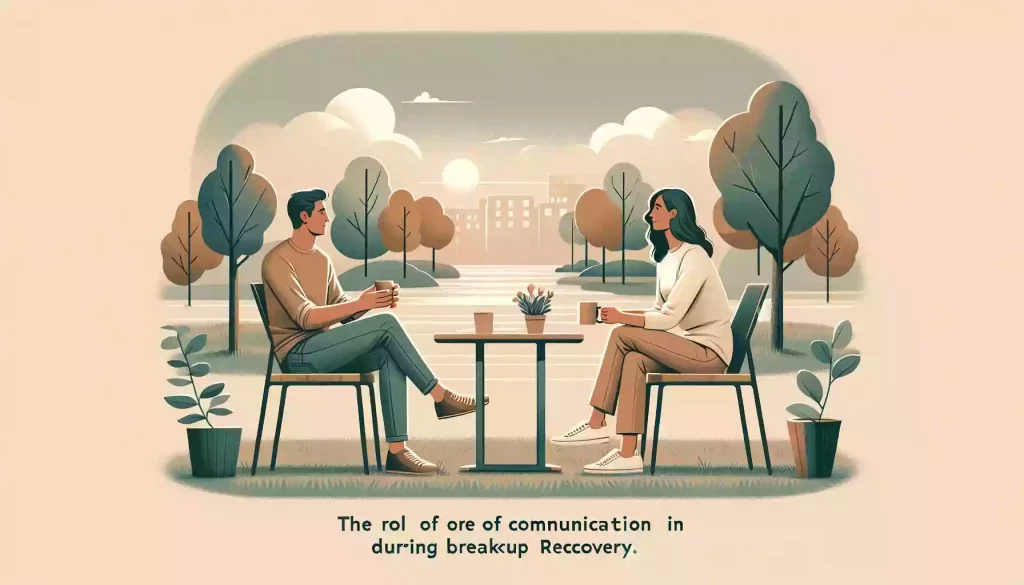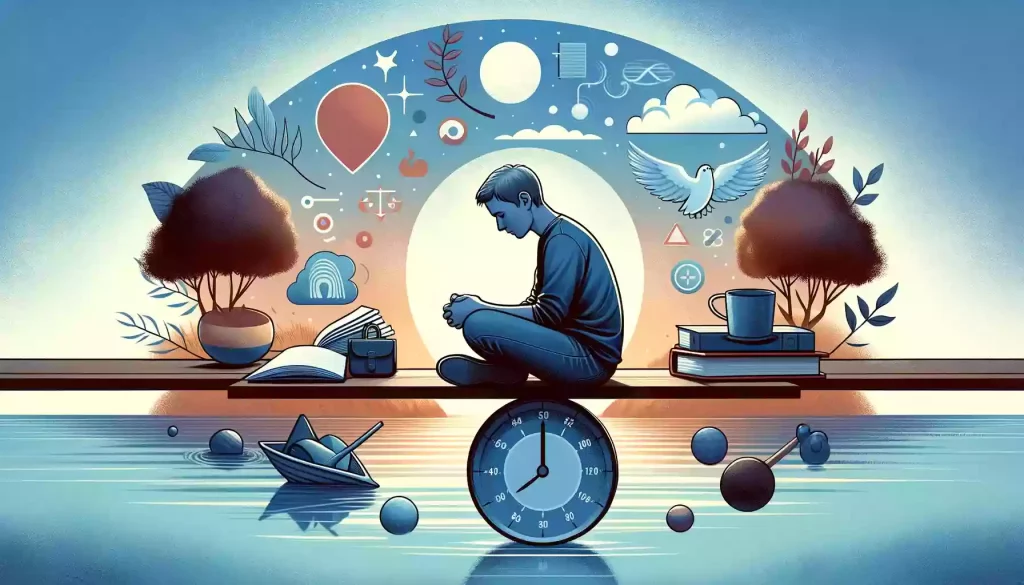Key Takeaways:
- Recognizing the unique impact of a 4-month relationship on emotional well-being.
- Identifying early signs of a potential breakup to better prepare and cope.
- Emphasizing the importance of personal growth and self-care post-breakup.
- Understanding the role of social support in healing from a breakup.
- Learning to set realistic expectations for future relationships.
Understanding the Impact of a 4-Month Relationship
Four months may seem brief, but the emotional impact of a relationship within this timeframe can be significant. This period often marks a transition from the honeymoon phase to a more realistic view of the partnership. Here, individuals begin to truly understand their compatibility and long-term desires. This phase of a relationship can leave a lasting imprint on one's emotional well-being, influencing future relationships.
During these months, couples often experience their first major disagreements and challenges. How these are navigated can set the tone for the relationship's potential longevity. It's also a critical time for personal growth and understanding individual needs within the context of a partnership. The intensity of emotions felt during this period can be a powerful force in personal development.
Additionally, the end of a 4-month relationship might bring unique challenges. Unlike longer relationships, where gradual detachment might occur, breakups after four months can feel abrupt and unexpected. This sudden change can leave individuals grappling with unresolved feelings and questions about what went wrong.
Moreover, societal perceptions may downplay the significance of a 4-month relationship, leading to feelings of isolation or trivialization of one's emotions. It's important for individuals to acknowledge and respect their feelings, regardless of the relationship's duration. Every experience, no matter how brief, contributes to our understanding of love and relationships.
Lastly, a 4-month relationship is often a stepping stone in understanding what one truly desires from a partner. It provides a brief, yet intense, insight into the dynamics of romantic relationships, setting the stage for future encounters and choices in love and life.
Recognizing the Signs of a Looming Breakup
Identifying the signs of an impending breakup can be crucial in preparing emotionally and mentally. One of the first signs is a noticeable decrease in communication. This might manifest as shorter, less frequent, and more superficial conversations. The depth and openness that once characterized the relationship might start fading, indicating a growing emotional distance.
Another sign is the diminishing of shared interests and time spent together. As the relationship nears its end, individuals may find themselves prioritizing other activities or people over their partner. This shift often occurs subconsciously and can be a defense mechanism against impending emotional pain.
A change in physical intimacy is also a significant indicator. This may not just mean a reduced sexual relationship but can also include less non-sexual physical affection, like hugging, kissing, or cuddling. Such changes often reflect a deeper emotional disconnection.
Additionally, increased arguments or conflicts can be a sign of a looming breakup. These might arise from previously minor issues that suddenly seem insurmountable, indicating a breakdown in communication and understanding.
Subtle changes in language can also be telling. Terms of endearment may give way to more formal language, or future plans might no longer include the partner. This linguistic shift often mirrors a changing emotional landscape.
Lastly, a gut feeling or intuition shouldn't be ignored. Sometimes, an internal sense of disconnect or the feeling that something is 'off' can be the most telling sign of all. Trusting one's instincts in these situations is often key to preparing for what's to come.
Emotional Stages Post-Breakup

After a breakup, individuals typically go through several emotional stages, starting with shock and denial. This initial stage is characterized by disbelief and a refusal to accept the end of the relationship. It's a defense mechanism that buffers the immediate shock, allowing one to process the news at their own pace.
The next stage often involves pain and sorrow. Feelings of sadness, regret, and grief can be overwhelming. This is a natural part of the healing process, where the heartache is most acute. It's important during this time to acknowledge these feelings rather than suppress them.
Anger and bargaining soon follow. It's common to feel angry, either at oneself, the ex-partner, or the situation in general. Bargaining may include 'what if' scenarios, where one imagines different outcomes had things been done differently. This stage reflects the struggle to make sense of the breakup.
Depression is a stage where the reality of the situation truly sets in. Feelings of emptiness, despair, and withdrawal are common. It's crucial to recognize this as a phase of healing and seek support if needed. During this time, self-care and compassion are vital.
The penultimate stage is reflection and acceptance. Here, there's a gradual acceptance of the reality of the breakup, accompanied by a deeper understanding of what occurred. Reflection can lead to valuable insights about oneself and relationships in general.
Finally, the stage of hope and moving forward emerges. This is when one starts to look ahead, embracing the possibilities of the future. There's a renewed sense of optimism and a feeling of liberation from the past. This stage signifies the completion of the healing journey.
Navigating Social Media After a Breakup
In today's digital age, navigating social media post-breakup presents unique challenges. Initially, it's advisable to take a break from social media to avoid constant reminders of the ex-partner. This break can provide the mental space needed to begin healing without external triggers.
Resist the urge to check your ex's social media profiles. This can lead to unnecessary pain and prolong the healing process. If it's too difficult to resist, consider unfollowing or blocking their accounts temporarily.
Be mindful of what you post. Avoid sharing details or emotions about the breakup online. Such posts can invite unwanted attention or advice and might hinder your recovery process. Instead, focus on posting content that reflects your interests and personal growth.
Reconnect with friends and family through social media. Use these platforms to strengthen your support network. Engage in positive interactions and share experiences that bring you joy and fulfillment.
Lastly, use social media as a tool for self-improvement and inspiration. Follow accounts that promote positivity, self-care, and personal growth. This can provide motivation and support as you navigate post-breakup life.
The Role of Communication in Breakup Recovery

Effective communication plays a crucial role in the process of recovering from a breakup. It begins with honest self-reflection. Understanding and articulating one's feelings, without self-judgment, is the first step towards healing. This internal dialogue helps in processing emotions and gaining clarity about the relationship.
Communicating with friends and family is equally important. Sharing your experiences with trusted individuals can provide support, different perspectives, and validation of your feelings. This external communication acts as a sounding board and can be instrumental in navigating the complex emotions of a breakup.
For some, a final conversation with the ex-partner may be necessary for closure. This should be approached with caution and should aim for a respectful and honest exchange. The goal isn't reconciliation but rather an understanding and respectful acknowledgment of the relationship's end.
Journaling can be a form of communication with oneself, providing a safe space to express thoughts and feelings. This practice can offer insights into personal patterns and emotional needs, aiding in future relationship decisions.
Lastly, open communication with new people and potential partners is crucial. It's important to be honest about one's emotional state and readiness for a new relationship. Clear communication in this stage can prevent misunderstandings and set the foundation for healthy future relationships.
Rebuilding Self-Esteem and Confidence
Rebuilding self-esteem and confidence post-breakup is essential for personal growth and future relationship success. The first step is recognizing that your self-worth is not defined by your relationship status. Understanding this can be empowering and is the foundation of rebuilding confidence.
Engage in activities that foster a sense of achievement and joy. Whether it's pursuing a hobby, excelling at work, or learning a new skill, these activities can enhance self-esteem and create a positive self-image.
Physical exercise can also play a significant role. Regular exercise not only improves physical health but also boosts mental well-being. The endorphins released during physical activity can lift your mood and improve your outlook on life.
Surrounding yourself with positive and supportive people is crucial. Being around those who recognize and appreciate your worth can significantly boost your self-esteem. Avoid people who bring negativity or doubt into your life.
Self-affirmations and positive self-talk can alter your mindset. Replacing negative thoughts with positive affirmations can shift your focus from what you believe you lack to the many qualities you possess.
Consider seeking professional help if needed. A counselor or therapist can provide tools and strategies to rebuild self-esteem and cope with the emotional aftermath of a breakup.
Finally, be patient with yourself. Rebuilding self-esteem is a gradual process, and setbacks are normal. Celebrate small victories and progress, and remember that personal growth takes time.
Balancing Loneliness with Personal Growth

Post-breakup, it's natural to feel a sense of loneliness. However, this period also presents an opportunity for substantial personal growth. Embracing solitude can be the first step towards self-discovery. It's a time to reflect on personal values, desires, and goals without the influence of a partner.
Engaging in self-improvement activities can transform feelings of loneliness into productive solitude. Whether it's reading self-help books, practicing meditation, or pursuing a new hobby, these activities foster personal development and provide a sense of achievement.
Setting personal goals during this time can be incredibly empowering. Goals provide direction and a sense of purpose, countering feelings of aimlessness that often accompany loneliness. They can range from small daily objectives to long-term aspirations.
Remember, it's okay to seek out social interactions when the loneliness feels overwhelming. Balancing time alone with time spent with others is key. This balance allows for personal growth while maintaining social connections that are vital for emotional well-being.
Finding Support Through Friends and Family
In the wake of a breakup, leaning on friends and family can be incredibly beneficial. They provide emotional support, practical advice, and a sense of belonging. Opening up to them about your feelings and experiences can be a cathartic and healing process.
Reconnecting with old friends or strengthening existing relationships can fill the void left by a breakup. These connections can offer a different perspective and help you see beyond the immediate pain of the breakup.
Family members often provide a different kind of support. They can offer a sense of unconditional love and stability. Spending time with family can be a comforting and grounding experience during turbulent times.
Participating in group activities with friends or family can also be therapeutic. Whether it's a casual outing, a hobby, or a group exercise class, these activities can provide distraction and joy.
It's important, however, to recognize when to seek solitude and when to engage with others. While friends and family are crucial, too much reliance on them can hinder the personal growth that comes from facing and processing your emotions independently.
Lastly, if friends and family are not enough, don't hesitate to seek support groups or counseling. Sometimes, talking to someone outside your immediate circle can provide new insights and coping strategies.
When to Consider Professional Help
After a breakup, it's normal to experience a range of emotions, but sometimes these feelings can become overwhelming. Recognizing when to seek professional help is important for your mental health. If you find yourself unable to perform daily activities or notice a persistent feeling of sadness, it might be time to consult a professional.
Other signs include prolonged insomnia or excessive sleeping, significant changes in appetite, or an inability to concentrate. These can be indicators of depression, which requires professional intervention. Don't hesitate to reach out if you notice these symptoms persisting.
If feelings of despair lead to thoughts of self-harm or suicide, seek help immediately. Mental health professionals can provide the necessary support and strategies to navigate these severe emotional states.
Professional help can also be beneficial if you find yourself stuck in a cycle of negative thoughts about the relationship or yourself. A therapist can help break this cycle, offering new perspectives and coping mechanisms.
Additionally, if you're struggling with substance abuse as a coping mechanism, this is a clear signal that professional help is needed. Substance abuse can exacerbate emotional pain and lead to additional problems.
Remember, seeking help is a sign of strength, not weakness. It shows a commitment to your well-being and a willingness to take steps towards healing and growth.
Rediscovering Yourself and Your Passions
A breakup can be a catalyst for rediscovering yourself and your passions. It's an opportunity to reconnect with the parts of yourself that you may have neglected. Start by reflecting on your interests and hobbies that brought you joy before or during the relationship.
Trying new activities can also be a great way to discover new passions. Be open to exploring different hobbies, sports, or creative outlets. These activities not only provide distraction but can also lead to new friendships and experiences.
Travel, if possible, can be a transformative experience. Exploring new places can provide a fresh perspective and a break from your routine. It's a way to rediscover your independence and the joy of being alone.
Lastly, consider volunteering or engaging in community service. Helping others can be incredibly fulfilling and can provide a sense of purpose and connection to the world around you.
The Importance of Closure
Closure is a critical aspect of the healing process after a breakup. It involves coming to terms with the end of the relationship and understanding why it didn't work out. This understanding can help prevent similar issues in future relationships.
One way to achieve closure is through conversation with your ex-partner, if possible and healthy. This should be approached with the intent of understanding and not reconciliation. It's about gaining insights into what went wrong from both perspectives.
Writing a letter, even if you never send it, can be another way to express your thoughts and feelings. This exercise can be therapeutic, allowing you to articulate and process your emotions.
Reflecting on the relationship's positive aspects and the growth it brought can also help in achieving closure. Acknowledge the good times and the lessons learned, as they are integral parts of your journey.
Remember, closure is a personal process and can't be rushed. It's about finding peace with the past, which takes time and self-reflection.
For some, closure might mean accepting that there will be unanswered questions. Not all relationships end with clear explanations, and sometimes, being okay with not knowing everything is part of the healing process.
Ultimately, closure is about letting go and moving forward. It's an important step in freeing yourself from past hurt and opening up to new experiences and relationships.
Setting Realistic Expectations for Future Relationships
After a breakup, it's essential to set realistic expectations for future relationships. Reflect on what you've learned from past relationships and understand what you truly want and need in a partner.
Avoid idealizing future relationships or expecting them to be perfect. Every relationship has its challenges, and it's important to enter them with a realistic mindset.
Communication is key in any relationship. Be clear about your expectations and needs from the start. This can help prevent misunderstandings and build a strong foundation for the relationship.
Lastly, remember that trust and understanding take time to build. Be patient and allow the relationship to grow naturally. Avoid rushing into things, as real connections develop over time.
Recommended Resources
- Getting Past Your Breakup: How to Turn a Devastating Loss into the Best Thing That Ever Happened to You by Susan J. Elliott, Da Capo Lifelong Books, 2009
- It's Called a Breakup Because It's Broken: The Smart Girl's Break-Up Buddy by Greg Behrendt and Amiira Ruotola-Behrendt, Broadway Books, 2005
- The Breakup Bible: The Smart Woman's Guide to Healing from a Breakup or Divorce by Rachel Sussman, Three Rivers Press, 2011
- How to Heal a Broken Heart in 30 Days: A Day-by-Day Guide to Saying Good-bye and Getting On With Your Life by Howard Bronson and Mike Riley, Broadway Books, 2002

.thumb.jpg.78735a344a3340a866dda54f465baebb.jpg)



.jpg.1626fbc48c04fd9021fd315819807524.thumb.jpg.882936eb5901fa05cf31c75617acde2e.jpg)
Recommended Comments
There are no comments to display.
Create an account or sign in to comment
You need to be a member in order to leave a comment
Create an account
Sign up for a new account in our community. It's easy!
Register a new accountSign in
Already have an account? Sign in here.
Sign In Now